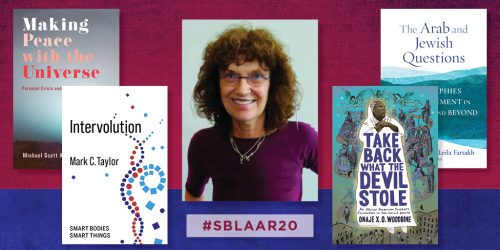Buddhism, Relationships, and Authenticity
Avram Alpert

A few years ago, I was driving through the Blue Mountains outside of Sydney with my wife, who is Australian. We were not yet married at the time and were still learning about each other. We had been silent for a while, enjoying the scenery. As we rounded a bend, she mentioned that there was a meditation retreat here, which reminded her of being a young traveler in Dharamsala, India, the home of the Tibetan government in exile and tens of thousands of Tibetan refugees. While there she had done a ten-day meditation retreat. She said that it had calmed and focused her mind by giving her coping tools during a difficult time.
I may have been jetlagged, or just being a bit of a jerk, but for whatever reason I responded with a rant. I, too, had lived in Dharamsala as a student and had planned to go on a retreat. But, I told her, I had changed my mind after a semester studying with Tibetans and living with monks. I had been surprised to discover that while almost none of them meditated, most of them ate meat. For the most part, they were concerned with staying alive and finding a way out of exile, not meditating to become more at ease in an anxious world. All these Westerners pouring into India seeking spiritual enlightenment were not only politically ignorant; they were chasing a mirage of their own creation.
This was not, as you might imagine, a particularly well-received response. Here was my future wife trying to tell me about an important moment in her life, when forming a new community had helped her to mitigate suffering, and my response—I’m usually not like this, I swear—was a condescending harangue that lumped her in with kooks and colonialists. I think some of my misplaced passion came from a sense that modern Buddhism had betrayed me. It had promised me an authentic way to live, but it was doing so based on an inauthentic version of Buddhist history.
I think some of my misplaced passion came from a sense that modern Buddhism had betrayed me.
In her 2002 novel The Autograph Man, Zadie Smith offers a narrative portrait of what happens to a person and their relationships when they are so steadfastly focused on a particular idea of being genuine. It tells the story of Alex-Li Tandem, a Jewish-Chinese-British autograph man. His job involves determining the authenticity of famous signatures, and the plot revolves around whether Alex has himself forged something from the reclusive movie star Kitty Alexander. Throughout the narrative, Alex tries to become a more truthful version of himself—but what exactly that means proves as elusive as determining the veracity of the signature. If he is currently a somewhat egocentric star chaser, is that what he’s supposed to be authentic to? One hopes not.
Indeed, in attempting to prove that the signature is genuine, Alex does tremendous damage to the relationships that could provide meaning to his life. When, for example, he is in a car accident with his girlfriend, Esther, the first thing he checks is not her health, but whether the autograph has been damaged. It is hard to imagine a more inauthentic response than to care about a possession and not a person. Or perhaps to care about a history of meditation and not a person.
I found, however, what anyone who seeks utopia finds: humanity, flaws and all.
I had not always been so preoccupied. In fact, my belief in the authentic tradition of mindfulness meditation was what brought me to Dharamsala in the first place. My wife and I were not alone in this understanding. When Buddhism began to circulate more globally in the twentieth century, its expounders promised not only that it was authentic but also that it would make you authentic. Unlike modern Western philosophy, which has often been more concerned with true descriptions of the external world than with meaningful insights into how to live well, modern Buddhists claimed a tradition that had always been about actually living out one’s ideas. Instead of suffering being an object of study or a theme of existential angst, it became something that one could actually end.
But the more I learned about the long history of Buddhism, the less it resembled what I’d read about. Buddhists were often engaged in nitpicky epistemological disputes, the mundane tasks of running a monastery, or the gruesome tasks of running an empire. I had once thought that Buddhist history showed a community dedicated to analyzing and—to the extent humanly possible—diminishing suffering, in both the self and the world. I found, however, what anyone who seeks utopia finds: humanity, flaws and all. I overreacted, becoming angry at modernizers and often denying the fact that Buddhist history, even in its modernist version, was still full of insights.
A seemingly inauthentic Buddhism has a starring role in Smith’s novel as well, with an entire part called “The Zen of Alex-Li Tandem.” But the Zen that Alex encounters is far from my youthful romanticized image. It’s almost always invoked as a cliché: for example, a sleazy autograph man says, “That’s why we don’t bid. We rise above. We are Zen.” And: “Whatever … Me and the Doveman, here: we’re Zen, we’re down for whatever. Wax on, wax off.”
The condition of being human is precisely that nothing resolves; everything continues.
Toward the end of the novel, Alex has his stereotypical “moment of Zen,” right before he and his friend go to a mourners’ service (Kaddish) for Alex’s father. Alex wants to get high, but his friend says no, today they have to be “fully present.” Something about this finally registers with Alex. For once, if not forever, he overcomes his egocentric ways. He doesn’t get high; he goes to the Kaddish; he does his best to be present among his friends and not chase after his fantasies. Sometimes, Smith shows us, what we’ve been promised—even by an inauthentic version of something like Zen—changes our life, makes us more responsive to, more just with, and more capable of hearing and responding to and challenging and being challenged by each other.
In that car, ranting against the inauthenticity of modern Buddhism, I had my own Smith-like moment of Zen. I took a deep breath and brought myself back to the present. I didn’t yet have the words to explain and apologize but did want to reconnect. I extended a calm and caring hand and put it on my wife’s hand. She smiled a little, appreciating the gesture.
I was not then solving the problems of the world or doing all the work I thought was necessary. But I was also not giving up on them by being present to and in touch with my partner, strengthening my resolve for future actions by learning to be authentic to the challenges of the moment. The situation wasn’t resolved. The condition of being human is precisely that nothing resolves; everything continues. But at least now, rather than suffering alone in our anxious silence, we were reconnected, sharing the burdens of being in this ever-imperfect world.
Avram Alpert is a Research Fellow at The New Institute, Hamburg. He is the author of A Partial Enlightenment: What Modern Literature and Buddhism Can Teach Us About Living Well Without Perfection.






